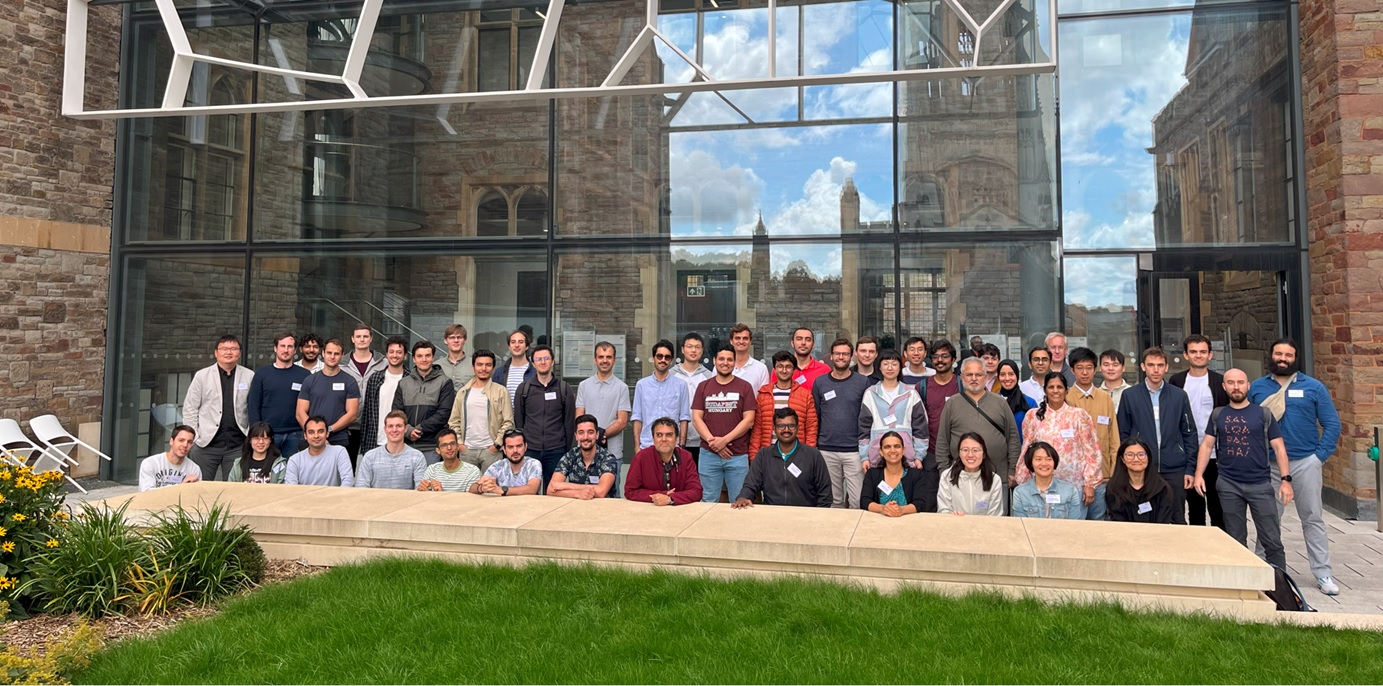




The 2023 European Summer school in Information Theory (ESIT 2023) was held in Bristol U.K., from 17th July to 21st July 2023. The event was hosted by the School of Mathematics at the University of Bristol, in the historic Fry building. Bristol is a vibrant and buzzing city located 120 miles west of London, and the largest city in the southwest of England, with a population of about half a million people. A lively art scene, rich cultural diversity and a fascinating history are all hallmarks of the city’s character, and these were appreciated and remarked upon by the participants -- they had an opportunity to experience some of Bristol during a mid-week Wednesday boat excursion, and to explore the city in the evenings.
There were over 60 participants, including a mix of postgraduate students, postdoctoral associates, industrial/governmental affiliates, and junior researchers, from institutions all over Europe and beyond, including from Switzerland, Germany, Norway, France, Sweden, Estonia, Russia, India, The Netherlands, Spain, the Czech Republic, Norway, the U.K., China and India.
The programme was structured around three tutorials (each comprised of four sessions of an hour each) and several spotlight talks (each comprised of one or two sessions of an hour each) on material of topical interest in Information Theory, Coding Theory, Computer Science, Statistics, and Machine Learning.
Tutorials
- Tobias Koch (Universidad Carlos III de Madrid, USA) - From the law of large numbers to the saddlepoint expansion and their application to channel coding theorems
- Rashmi Vinayak (Goldsmith lecturer, CMU, USA) - Coding theory for distributed systems
- Mary Wootters (Stanford, USA) - List-Decoding and List-Recovery in Error Correcting Codes
Spotlight talks
- András György (DeepMind, U.K.): (1) Transfer Learning with Pretrained Classifiers, (2) Zeroth order (stochastic) convex optimization
- Varun Jog (Cambridge, U.K.): The sample complexity of simple binary hypothesis testing
- Po-Ling Loh (Cambridge, U.K.): Robust empirical risk minimization via Newton's method
- Marco Mondelli (IST, Austria): (1) Inference in High Dimensions for (Mixed) Generalized Linear Models: The Linear, the Spectral and the Approximate, (2) Understanding Gradient Descent for Over-parameterised Deep Neural Networks: Insights from Mean-Field Theory and the Neural Tangent Kernel
- Michèle Wigger (Telecom Paris Tech, France): Information-Theoretic Limits of Distributed Detection Systems

In addition, the program included a poster session in which participants presented their recent research, and a free-form “Meet the Speakers” event in which participants could discuss questions around research, academic life, and career progression by circulating between tables where the speakers were sitting. These events, in conjunction with half-hour breaks after each speaker session, proved popular among participants, helping them network with their peers and interact with speakers. Feedback from participants about the organization and the program was almost uniformly positive.
The program was made possible due to generous support by the Information Theory Society, Huawei, the London Mathematical Society, the Heilbronn Institute for Mathematical Research, and the School of Mathematics at the University of Bristol. Thanks to all this support registration costs were kept quite low (starting at £60 for IT Society members), heavily subsidized accommodation (costing £50 for 5 nights) was provided to most participants, and significant travel support was provided for those who applied. The organizers (Oliver Johnson and Sidharth Jaggi of the University of Bristol, and Deniz Gündüz of Imperial College London) would also like to particularly thank the organizational and administrative support provided by Louisa Bartoszewicz of the School of Mathematics at the University of Bristol.


